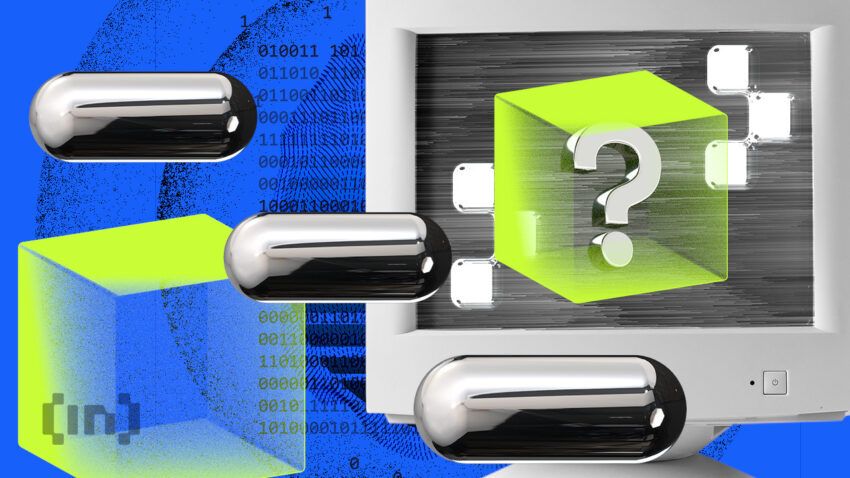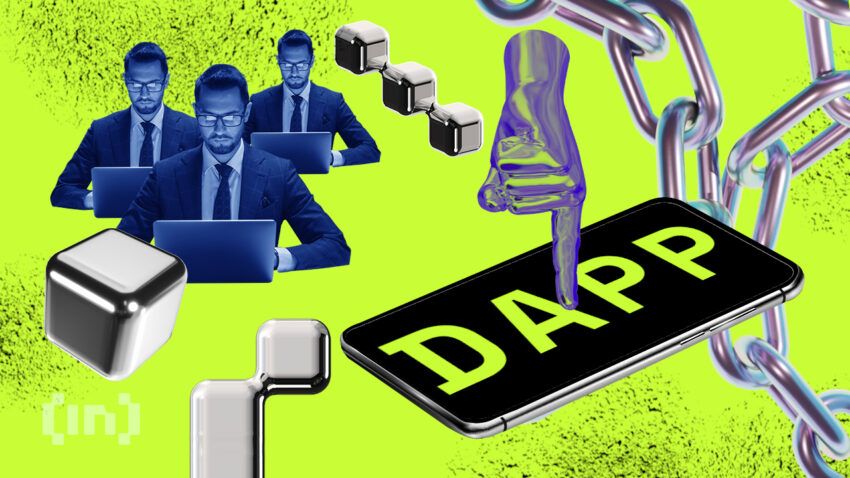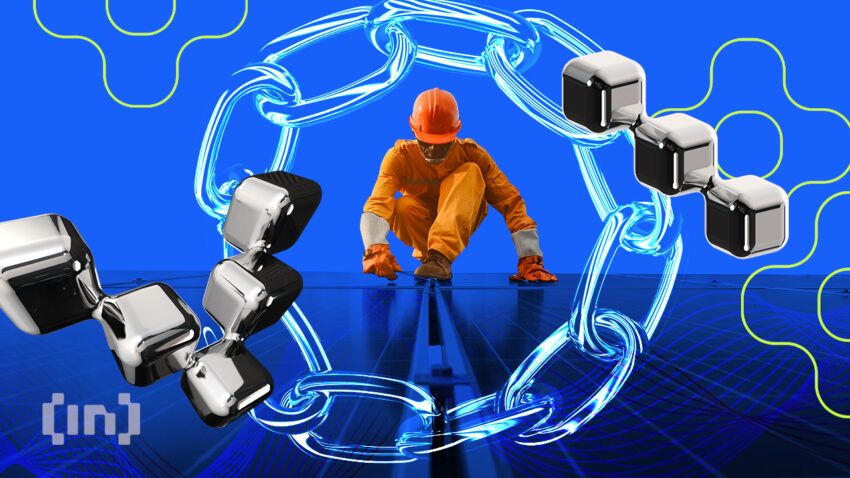Blockchain nodes are essential parts of every permissionless and permissioned distributed ledger. Meanwhile, blockchain RPC nodes can be better understood as gateways designed to let developers access blockchains in an easy and cost-effective manner.
This guide outlines the concept of blockchain RPC nodes and the role of these nodes in web3 development. Plus, we cover the best solutions with RPC nodes available in 2023.
BeInCrypto Trading Community in Telegram: read reviews on the best crypto projects, get the hottest news on crypto, read technical analysis on coins & get answers to all your questions from PRO traders & experts!
- What is a blockchain RPC node? An overview
- Definition of RPC
- What is an RPC endpoint?
- Types of RPC endpoints in blockchain
- Why do web3 developers need private RPC endpoints?
- RPC endpoints by blockchain node providers
- How to get RPC endpoints for your DApp
- Blockchain RPC nodes are DApp game changers
- Frequently asked questions
- About the author
What is a blockchain RPC node? An overview

Blockchain RPC nodes are crucial elements of global cryptocurrency ecosystems. They supercharge all use cases of web3. NFT marketplaces, crypto exchanges, trading bots, and distributed data storage systems — all of the above send remote procedure calls to blockchain nodes.
Note that with blockchain RPC nodes, DApps don’t need to run blockchain nodes independently. Instead, they can connect to public and private RPC endpoints. Private endpoints are go-to solutions for commercial usage maintained by blockchain RPC node providers.
Definition of RPC
RPC or remote procedure call is a request-response protocol designed to allow a program on one computer to call a subroutine (standardized procedure or operation) on another machine. In general, it looks like Alice is asking Bob to do something without Alice knowing that Bob is remote.
In RPC protocol, each call (request) is matched by its answer (response). So, there’s no need for developers to write the same programs repeatedly: it streamlines the development process and makes the use of computation resources more cost-efficient.
What is an RPC endpoint?
RPC endpoints work unlike URLs: defining the location where the decentralized applications can send requests to blockchain nodes. Blockchain nodes are computers with special client software that are synchronized with their peers. In fact, blockchain is an ecosystem of blockchain nodes that share information with each other.
As such, when a DApp connects to an RPC endpoint, it can start using blockchain data, i.e., retrieving the information from the blockchain and sending (‘writing’) it to another one. An RPC endpoint acts as a point of entry to the blockchain: DApps need them to confirm the operations authorized by their users.
For instance, when a player in a blockchain-based game wins the tournament, the game should top up his or her balance. In order to do so, the application uses a blockchain RPC endpoint. It requests data about the balance before the tournament. It then sends the information to the blockchain about the necessity to increase the balance once the transaction from the game account is complete.
Types of RPC endpoints in blockchain
While various applications use blockchain RPC endpoints of different types, there are two main subclasses: public RPC endpoints and private RPC endpoints.
Public RPC endpoints
Public RPC endpoints are basic-level gateways to RPC nodes. Typically, they are created by blockchain teams to allow developers to start building on their nodes with minimum expenses. For instance, the list of public Ethereum RPC endpoints is curated by Ethereum Foundation, the list of public AVAX RPC endpoints is published on Avalanche’s main website, and so on.

What is special about public RPC endpoints, and what makes them popular? Simply put, they are free and accessible. Everyone can build on these endpoints, and everyone can integrate public RPC endpoints into their decentralized application with zero fees. The list of these endpoints is public: users can try them without registration or sharing personal data.
Public RPC endpoints can be useful for research and development, testing, and education purposes. However, these endpoints aren’t suitable for commercial applications. Public RPC endpoints work with limited bandwidth and are offered ‘as is’: users can’t request technical support, customization, or tailored solutions.
Note that public RPC endpoints can’t scale and are too slow to run decentralized applications for massive adoption. As such, public endpoints can be integrated into blockchain-based apps for personal use (wallets, trading bots, and so on).
Private RPC endpoints
In 2023, decentralized entities of all types — wallets, NFT marketplaces, DeFi, and so on — need highly scalable, fast, flexible access to RPC nodes. As such, the private RPC endpoints segment has continued to gain traction since the 2020-2021 bullish rally.
A private RPC endpoint is an endpoint to a blockchain node that is managed by a private entity. Its manager (a blockchain RPC node provider) is responsible for keeping it active, operable, and scalable. At the same time, the provider charges the clients for requests they send to the blockchain.

While working with private blockchain RPC nodes, users can customize the number of blockchains they use (e.g., Ethereum, Solana, and Arbitrum endpoints can be accessed via a single interface), the requests count per 24 hours (or unlimited monthly requests), the type of network (testnet/mainnet), the interface (JSON RPC, WebSockets, gRPC) and so on. For these services, clients pay in crypto or fiat.
To start using private RPC endpoints, developers of crypto applications should register an account, set up the endpoints toolkit and pay for the package.
Why do web3 developers need private RPC endpoints?
Private RPC endpoints are essential for modern decentralized applications as they are fast, flexible, and scalable.
- Speed: As the resources of public endpoints are limited, they can’t achieve the response speed required for modern applications. Too many users are trying to use them for free, so there’s no possibility of establishing a sustainable connection for everyone.
- Flexibility: Public RPC endpoints don’t have support teams to make their APIs suitable for various use cases. For instance, no public infrastructure provider will be able to connect a DApp to archive Arbitrum nodes as it is too expensive to run.
- Scalability. With private infrastructure, you can always ask for additional throughput if you’re out of requests. Also, you can book a premium infrastructure – a one-of-a-kind solution tailored to your needs.
That’s why it’s a smart bet for web developers to work with a blockchain node provider in 2023.
RPC endpoints by blockchain node providers
Blockchain node providers are services that fuel decentralized applications with private RPC endpoints. With RPC providers, you don’t need to use slow public RPC endpoints, let alone run self-hosted nodes.
For reasonable prices, blockchain RPC node providers give developers access to blockchains, both programmable (Ethereum, Polygon, Arbitrum) and non-programmable (Bitcoin, Litecoin).
Web3 infrastructure heavyweight GetBlock is among the most trending blockchain RPC node providers. With GetBlock, developers can access 50+ blockchains using free and paid packages. Further, the RPC node provider works with 99.9% uptime and offers easy onboarding: users need a MetaMask wallet to register an account.
Chainstack, Alchemy, and Infura are also popular GetBlock alternatives. These competing services also offer RPC endpoints for all sorts of decentralized applications.
How to get RPC endpoints for your DApp

To start using private blockchain RPC endpoints, developers should complete the following steps:
- Register an account on the website of the RPC node provider.
- Select the blockchain they are interested in.
- Choose the configuration of the API endpoint.
- Select the tariff plan; if the paid package is selected, the user should pay in crypto or fiat to activate it.
- Once the RPC endpoint is activated, the user can integrate it into the codebase of their DApp and start sending requests to blockchain nodes.
When the request limit is close to expiration, the provider typically notices the user that they need to top up the account.
Blockchain RPC nodes are DApp game changers
To sum up, a blockchain RPC node is a computer in a blockchain that is synchronized with its peers and can process requests to said blockchain. Decentralized applications need blockchain RPC nodes to run their operations. RPC endpoints are URLs designed to connect DApps to blockchain nodes. They can be integrated into the codebase of DApps to send data to networks and retrieve it from them.
In 2023, public and private RPC endpoints are available; public endpoints can be used for free, while private endpoints are suitable for commercial usage and scaling. Private RPC endpoints can be requested from blockchain node providers, which charge users for the requests they send to blockchains. In all, blockchain node providers facilitate scalability, making building and running web3 DApps a more seamless and efficient operation for all.
Frequently asked questions
What is a blockchain RPC endpoint?
Does blockchain use RPC?
What RPC endpoint is best?
What is an RPC node in Solana?
What is an RPC node in Ethereum?
About the author

Deen Newman is a project manager at GetBlock. Newman is a renowned crypto tech writer with a vast knowledge of blockchain technology and its potential applications. He has been writing for crypto media for more than 5 years, and his in-depth analysis and expert commentary have made him a respected voice in the crypto community. Newman brings a reputation for delivering high-quality content that is both informative and engaging.
Newmans passion for technology and his dedication to staying up-to-date with the latest developments in the field make him a valuable asset to anyone seeking to understand the complex world of cryptocurrency.
Disclaimer
In line with the Trust Project guidelines, the educational content on this website is offered in good faith and for general information purposes only. BeInCrypto prioritizes providing high-quality information, taking the time to research and create informative content for readers. While partners may reward the company with commissions for placements in articles, these commissions do not influence the unbiased, honest, and helpful content creation process. Any action taken by the reader based on this information is strictly at their own risk. Please note that our Terms and Conditions, Privacy Policy, and Disclaimers have been updated.




